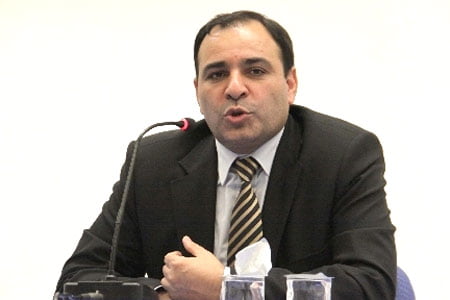Gülen’s ideas address the entire world

Date posted: October 19, 2010
We shouldn’t be surprised at Fethullah Gülen’s success in a poll of the top public intellectuals. He leads a truly global movement, Gulen movement. This article makes reference to the fact that Gulen was chosen Top Intellectual of the World in 2008.
Bulent Kenes
The ideas of Fethullah Gülen, the most discussed figure of Turkey for decades now, have become important topics in the intellectual circles of the world in recent years. Having millions of followers worldwide in addition to those in his own country, Gülen has risen to prominence with his statements and actions that shatter the twisted perception of Islam into a thousand pieces.
Attracting attention with his arguments for inter-religious dialogue and tolerance at a time when Samuel Huntington’s “clash of civilisations” has such currency, Gülen has not stayed at the level of creating ideas, but has created a practical platform on which these ideas can be carried out. This quality of his makes him one of the leading intellectuals of the world as well as one the greatest men of action.
He has not rested content with writing about his approaches. These can be roughly summarised as living together in peace; appreciating differences; accepting everybody as they are and bringing about inter-religious and intercultural dialogue and tolerance, which he developed to counter the theses of inter-religious and intercultural clashes. For the realisation of his ideals, he has initiated a civil voluntary movement (aka Hizmet movement). Today Fethullah Gülen is able to easily mobilise his followers, estimated at millions, who are craving to accomplish his ideal of transforming the world into an oasis of peace.
Retaining a strong belief that creating a peaceful world is possible through education and having dedicated his life to this cause, Gülen advises all his followers to dedicate all their physical strength and spiritual energy to education. And in return, his followers, who do not see in his thoughts and statements a single word that could be averse to the good of humanity, are making considerable efforts in this direction. As a result of these efforts, the younger generation is learning the ways of living together in hundreds of schools opened by Turkish entrepreneurs in over 110 countries of the world dominated by different religions, languages and cultures.
The children of Bosnians and Serbs, Kurds and Turkomans, Russians and Chechens and Hindus and Muslims who have fought one another, peacefully study in the same classrooms in these schools.
Gülen has proved through his thoughts, statements and actions that Islam is a religion of peace even though it is almost completely associated with fundamentalism, extremism and violence in the west because of radicals in the Islamic world. And he is famed for the very intimate ties he had established with the late Pope John Paul II and with Patriarch Bartholmew of Constantinople, the Armenian Patriarch Mesrob II Mutafyan and many other representatives from other religions.
Gülen’s thoughts and actions have recently started getting the attention of the international media.
It is possible to mention many other examples that prove the universal nature of Gülen’s philosophy. However, to me, the biggest proof is that a major part of Gülen’s followers comprises of people from many different ethnicities, religions and cultures other than Turks and Muslims. Today from Siberia to Australia, from China to Canada, and from Sweden to Brazil, you may find thousands of people who act upon the ideas Gülen developed for a peaceful world.
Holding that terrorism cannot be attributed to any religion and completely rejecting violence, Gülen has drawn a distinction between terrorism and Islam by stating after 9/11 that, “Muslims cannot be terrorists; if they are terrorists, they are not Muslims”. He has reiterated his condemnations numerous times, targeting Osama bin Laden and al-Qaida.
In addition, many universities have held symposia and established chairs in the name of Gülen, who attracts the attention of the academic world in many countries. One of the most recent academic events took place in 2007 in London under the auspices of the House of Lords and with the participation of the School of Oriental and African Studies and the London School of Economics.
In light of all this, nobody should feel surprised about his selection as number one in the top 100 public intellectuals survey conducted by Foreign Policy and Prospect magazines. Just the opposite, we should all be surprised if he doesn’t receive the Nobel peace prize in the near future.
Original story may be found at: http://www.guardian.co.uk/commentisfree/2008/jun/24/turkey.islam, Tuesday 24 June 2008
Tags: Fethullah Gulen |
























